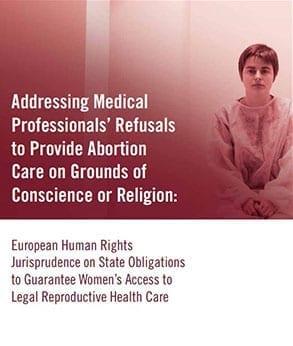U.N. Human Rights Council Passes Resolutions to End Violence Against Women and Child Marriage
(PRESS RELEASE) This week the U.N. Human Rights Council—principal body at the U.N. that promotes and protects human rights for all—reaffirmed its commitment to women’s and girl’s human rights by passing key resolutions to end violence against women and eradicate child, early and forced marriage.
Today, the U.N. Council passed a resolution condemning all forms of violence against women and calling on states to implement policies that promote gender equality, prevent and protect women and girls from domestic violence, as well as improve legal procedures for women seeking justice from abusers.
The U.N. Council also unanimously adopted its first substantive resolution to prevent and end child, early and forced marriage, an illegal practice that affects 15 million girls every year.
Said Rebecca Brown, global advocacy director at the Center for Reproductive Rights:
“Governments have a clear obligation to respect the human rights of women and girls by taking every step necessary to prevent violence, abuse, and forced marriage.
“Today’s critical U.N. resolutions fully recognize the impact this global pandemic has on the livelihood and rights of countless women and young girls, and rightfully calls on government officials to take immediate action.
“Domestic violence and child, early and forced marriage reinforce discrimination against girls and women across the globe. The UN needs to continue to be outspoken on these issues and show leadership in calling for advancements in the realization of women and girls human rights.”
The U.N. Council’s resolution on violence against women recognizes the human rights abuses that stem from domestic violence and how this is a societal problem and manifestation of gender inequality. The resolution urges states to condemn all forms of violence against women and girls, and to “refrain from invoking any custom, tradition or religious consideration to avoid their obligations with respect to its elimination, including harmful practices, such as child, early and forced marriage and female genital mutilation.” It also underscores that domestic violence is of public concern and that states have the primary responsibility for protecting and promoting the human rights of women and girls facing violence, including those facing domestic violence.
In unanimously adopting the child, early and forced marriage resolution, the U.N. Council also urges governments to promote and protect the human rights of all women and girls, including their right to have control over and decide freely and responsibly on matters related to their sexuality. The resolution calls on states to implement national action plans on child marriage, and encourages partnering with civil society groups to develop and implement a holistic, comprehensive and coordinated response to address child marriage and support married girls.
In 2013 the Center issued the report Child Marriage in South Asia: Stop the Impunity examining the consequences of child marriage, which subjects girls to serious crimes, including domestic violence and marital rape, placing their reproductive health and lives at serious risk. The report questions the failure of governments to prevent and prosecute cases of child marriage. Since the launch of the report, the Center has supported the efforts of the South Asia Initiative to End Violence Against Children (SAIEVAC), in building a regional commitment to end child marriage and applauds the progress being made under the leadership of SAIEVAC to promote stronger legal accountability to end child marriage in the region.
The Center has played a part in some of the most important advances in reproductive rights worldwide. At the U.N. Committee on the Elimination of Discrimination against Women, the Center secured historic financial reparations for the family of a young Brazilian woman who died from preventable pregnancy complications—the first time an international human rights decision named maternal health a human rights. And at the European Court of Human Rights, the Center called upon Poland to ensure adolescents’ reproductive rights after access to a legal abortion for a rape survivor was repeatedly obstructed.

